Contents
Guide

The author and publisher have provided this e-book to you for your personal use only. You may not make this e-book publicly available in any way. Copyright infringement is against the law. If you believe the copy of this e-book you are reading infringes on the authors copyright, please notify the publisher at: us.macmillanusa.com/piracy. This book is dedicated to the memory of ELIZABETH FERRY CHAFFEE PENELOPE FERRY SMITH BERNICE FRANCES DAVIDSON Introduction Meliboeus has been dispossessed of his pastures and Tityrus has been put into possession of his, and sits contentedly under a beech tree playing his pipe. Another shepherd, Corydon, alone in the noontime midsummer heat, hopelessly in love with a beautiful boy, sings of his love with confused ridiculous convincing passion.
Menalcas and Damoetas, rubes, quarrel furiously and hilariously, and then compete in songs of love, and riddles, and work songs, and Palaemon, their neighbor, declares their singing contest a tie. The poet offers a charming birthday gift to a newborn child. The gift is immense, a prophecy that the child will preside over a new golden age and a new society, in which there will be no war, no labor, no sorrow. Mopsus and Menalcas, with exquisite mutual courtesy, take turns singing about the shepherd Daphnis, first about his death and its bad consequences for the crops and then about his apotheosis and how there will be offerings to him, blessing the fields. A drunken satyr, Silenus, the tutor of Bacchus, god of wine and song, having been playfully tied up with his own garlands by two boys and a water nymph, sings the songs he had promised them he would sing: stories, among others, of the beginning of the world, the love of Pasipha for a bull, the violent murderous story of Procne, the story of Scylla the whirlpool drowning the Ithacan sailors, and the story of the calling of Gallus, an actual poet and important figure in Virgils world of literature and politics, to be a poet under the sign of Hesiod and Linus. Daphnis, maybe the same Daphnis, maybe not, calls Meliboeus, who maybe is or maybe is not the same Meliboeus, to hear a singing contest between the Arcadian shepherds Thyrsis and Corydon, and Corydon, who may or may not be the same Corydon, is declared the victor, though it is hard to see why, both songs being so compellingly beautiful.
But Corydons is the sweeter. Damon, at the brinkor, in his song, as if at the brinkof suicide, sings of Nysas abandonment of him, and of her marriage to Mopsus. Alphesiboeus sings a contending song, as if in the voice of a woman who loves Daphnis and casts spells to bring him back to her. Perhaps Daphnis does return or perhaps she deludes herself. Moeris and Lycidas are going to town. Evening is coming on, and perhaps a rainstorm is coming as well.
One of them has been dispossessed of the ownership of his land. The shepherd Menalcas (surely not the clown Menalcas?) had promised to hold their world together with his music. But what can music do / Against the weapons of soldiers? Moeris and Lycidas, as they journey toward town, past the tomb of still another shepherd, are remembering and yet forgetting their songs. Gallus is heard lamenting Lycoriss desertion of him. He says, as his song comes to an end, now farewell, Nymphs; / No longer do our songs give pleasure now; / Farewell to the groves. * * * Wendell Clausen says that not only did Virgil compose the Eclogues, he also, and to some extent simultaneously, composed the Book of Eclogues, a poetic achievement scarcely less remarkable [In] Virgils book the design of individual poems has been adjusted to the design of the book as a whole. * * * Wendell Clausen says that not only did Virgil compose the Eclogues, he also, and to some extent simultaneously, composed the Book of Eclogues, a poetic achievement scarcely less remarkable [In] Virgils book the design of individual poems has been adjusted to the design of the book as a whole.
The Eclogues are a book in ways that are obvious and not so obvious. Eclogue IX, almost at the end of the series, clearly echoes Eclogue I and sadly completes it, as the shepherds, dispossessed like Meliboeus, journey to the town, and the songs are being forgotten. Eclogues II, VIII, and X tell versions of the same erotic story, of abandonment and longing, and each one says hard things about the implacability of love and loves cruelty: Each creature is led by that which it most longs for; I know what Love is Love / Is not of our blood and he is not of our kind; what could teach the god of love to pity? Love conquers all, and all must yield to Love. Eclogues VII and III are alike in being singing contests, and V is a contest too, uncontentiously, and all three of them sing about, among other things, the hardness of labor in the fields and vineyards and the precariousness of the shepherds and cowherds life: The field is dry; in the blighted air the grass / Is dying for lack of water; Bacchus denies / The shade of his vines to the arid hill; Round up the sheep, boys, find the cool of the shade; / This heat will dry the milk up in the udders My flock is skin and bones, and it isnt for love; / The evil eye is on my lambs. But whose?; Apollo has left our fields, and Pales too. / In the furrows where we hopefully planted barley, / Darnel and tares and sterile oat-grass grow.
Eclogues IV and VI invoke the Muses, and each, in its own way, goes out beyond (while still remaining within) the limiting fiction of pastoral song. Clearly their occurrence at the center of the sequence, along with the sublime apotheosis in V, is a significant feature of our experience of the shape of the book. There are patterns, too, of political attitudes, attitudes toward power, and specifically toward the Julian house, the house of Julius Caesar and Octavian (Augustus). In Eclogue I there is Tityruss gratitude to Octavian for his land, in tension with Meliboeuss having been unpropertied so that it could be given to Octavians veterans. Meliboeus says bitterly: This is what civil war has brought down upon us. / So Meliboeus, carefully set out / Your plants and pear trees, all in rowsfor whom? / For strangers, for others, we have farmed our land.
In Eclogue V it may be that one way (though only one way) to read Daphniss death is to think of the death of Julius Caesar, and in Eclogue IX one of the half-forgotten, half-remembered songs predicts the rising of Julius Caesars star in the sky: Venuss grandson Caesars star is rising / The star that brings such joy to the ripening grain / Daphnis, plant your pear trees years from now / The children of your children will gather the pears. That this is a book is implicated in every expression of the opening passage of Eclogue VII: Daphnis, one day, was sitting in the shade Of a murmuring ilex tree, and Corydon And Thyrsis, both nearby, were tending their flocks, Thyrsis his sheep and Corydon his she-goats, Their udders swollen with milk. Thyrsis and he Were both like flowers in bloom, the two of them, Arcadians both, and ready to compete With song replying to song replying to song. And I was a little way off, mulching the roots Of my myrtle plants to keep them from the cold. My billy goat, the boss man of my flock, Had wandered away somewhere, away from the others. Then I saw Daphnis and Daphnis caught sight of me And he called out, O Meliboeus, come here, Come here and sit in the shade, and rest yourself.
Your goats and kids are perfectly safe and sound; Your oxen will come this way all by themselves Across the fields and down to the stream to drink From Mincius cool waters where the reeds Flower along the riverbanks and where The bees are humming around the ancient oak. I thought, why not? I have no Phyllis at home And no Alcippe to care for the just-weaned lambs, But Corydon and Thyrsis in a contest Is a contest not to miss. The rural scene is very actual, the she-goats udders brimming with milk, Meliboeus mulching his plants to protect them from the cold, no Phyllis or Alcippe at home to share his chores, his billy goat wandering off. The river Mincius is the actual river of Virgils own childhood. Daphnis and Corydon and Thyrsis are local herdsmen and shepherds. But they have names from literature, from Theocritean Idylls, and two of them, Corydon and Thyrsis, who are like flowers in bloom, are not from Italy but from Arcadia, matrix of pastoral song.


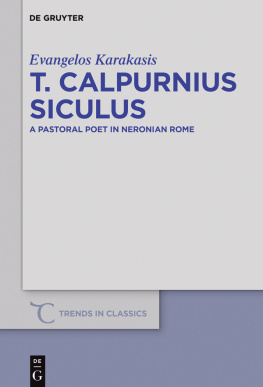
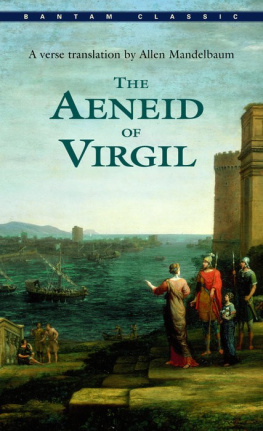

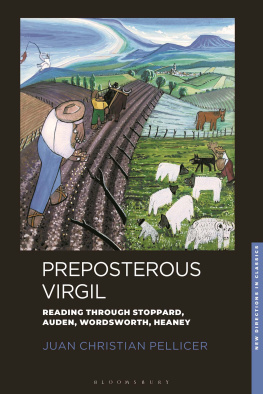

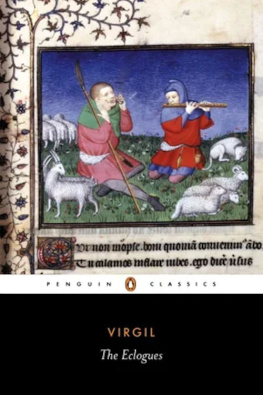
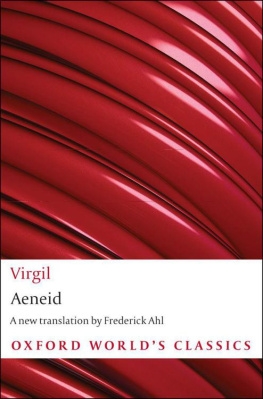


 The author and publisher have provided this e-book to you for your personal use only. You may not make this e-book publicly available in any way. Copyright infringement is against the law. If you believe the copy of this e-book you are reading infringes on the authors copyright, please notify the publisher at: us.macmillanusa.com/piracy. This book is dedicated to the memory of ELIZABETH FERRY CHAFFEE PENELOPE FERRY SMITH BERNICE FRANCES DAVIDSON Introduction Meliboeus has been dispossessed of his pastures and Tityrus has been put into possession of his, and sits contentedly under a beech tree playing his pipe. Another shepherd, Corydon, alone in the noontime midsummer heat, hopelessly in love with a beautiful boy, sings of his love with confused ridiculous convincing passion.
The author and publisher have provided this e-book to you for your personal use only. You may not make this e-book publicly available in any way. Copyright infringement is against the law. If you believe the copy of this e-book you are reading infringes on the authors copyright, please notify the publisher at: us.macmillanusa.com/piracy. This book is dedicated to the memory of ELIZABETH FERRY CHAFFEE PENELOPE FERRY SMITH BERNICE FRANCES DAVIDSON Introduction Meliboeus has been dispossessed of his pastures and Tityrus has been put into possession of his, and sits contentedly under a beech tree playing his pipe. Another shepherd, Corydon, alone in the noontime midsummer heat, hopelessly in love with a beautiful boy, sings of his love with confused ridiculous convincing passion.